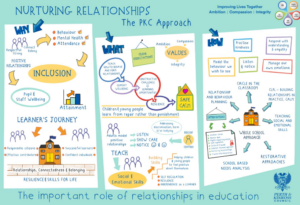Relationships & Restorative Approach in our School
In Aberuthven Primary School, we are committed to providing a happy, safe, welcoming, nurturing, calm and purposeful school environment in which: every member of the school community feels valued, respected and treated fairly; our young people can learn effectively and reach the highest standards of which they are capable.
Good behaviour choices are essential in ensuring that high quality learning and teaching can take place and we believe that a positive whole school approach is the most appropriate means to achieving this goal.
The aim of our Relationships Policy is to ensure consistency of approach within our school community. This Policy links directly to our school Anti-Bullying Policy which upholds and aims to maintain the same values across our school community.
The Ethos of the School
The ethos of our school is built on our core values of ‘Respect and Opportunities for All’. These values are the basis for the social, intellectual, emotional and moral development of the whole young person. We encourage pupils to consider these values, thereby acquiring knowledge, skills and attitudes which enable them to develop as responsible citizens, successful learners, effective contributors and confident individuals.
We aim:
- To encourage every child to do their best at all times, to take responsibility for their work and by encouraging a positive attitude enhancing their skills and knowledge.
- To support every child to adopt a Growth Mindset.
- To promote a culture that encourages children to be aware of their rights and responsibilities. They are also to be aware of the rights of others.
Respect
Strong relationships based on mutual respect are at the heart of our school. Every member of Aberuthven Primary School must respect each other’s rights to;
- feel safe and happy within our school
- be treated with courtesy and consideration
- learn and work
Importance of Relationships in Perth & Kinross Council
In Perth and Kinross, we promote a culture and ethos in our settings where positive, respectful relationships are valued and invested in. Our aim is that all schools will have a clear vision for relationships, which will be based around all staff having a core understanding of attachment that will drive attuned and healthy relationships as the foundation for learning within classrooms.

A short video explaining the PKC ethos on relationships can be viewed here.
PKC Parent-School_Relationships_Leaflet also outlines what Parents can expect from Schools in the local authority.
Restorative Practice
At Aberuthven Primary School staff are encouraged to adopt a restorative approach to dealing with challenging behaviour and conflict focusing on building, maintaining and, if necessary, repairing relationships rather than managing and controlling behaviour. We aim for an environment where bullying cannot thrive.
Principles of Restorative Practice:
- Fostering strong relationships. This includes staff working with other staff, pupils working together with other pupils, and pupils and staff working together as a team.
- Respecting other people, their views and feelings.
- Being responsible for our actions and their impact on others.
- Empathising with other people’s feelings.
- Being fair and committed to equitable processes.
- Everyone in school being actively involved in decisions about their own lives.
- Returning issues of conflict to the people who are directly involved.
Values of Restorative Practice:
- Young people are social beings- they prefer to feel they belong rather than to feel isolated or rejected.
- Young people develop a sense of fairness, justice, right and wrong.
- Young people change and their behaviour can change.
- The way staff work with and relate to a young person can influence his /her feelings, thoughts and actions.
Restorative approaches help ensure that pupils, staff and parents can be part of a fair process, while helping all involved to understand the impact of their behaviour on others. Whether they are a perpetrator or victim, their focus is not on winning or losing, but on trusting in a fair process.
Restorative approaches can:
- Help develop a whole school positive ethos.
- Encourage members of the school community to effectively resolve and learn from conflict in a way which maintains relationships.
- Support any necessary sanctions by processes of learning and reconciliation.
Restorative approaches can be used at different levels in school:
- As preventative- to promote positive relationships within the whole school community.
- As responsive- to deal with problems and repair relationships when difficulties arise
- As part of support and intervention for more long term and persistent difficulties.
Any incidents with arise during a school day will be dealt with by a member of staff using Restorative Practise as soon as staff are able, preferably that day. Restorative Practise encourages pupils to learn from choices they have made and find a positive pathway forward, which in turn helps to restore any damage done to relationships between members of our school community. Any necessary consequences will be discussed during the restorative conversation and agreed by some of those involved. Staff encourage pupils to help set consequences which aim to restore any damage which may have been done. To protect and restore dignity of pupils following an incident, consequences are not always shared with all involved in the incident.
Staff aim to share details of any incident with families as soon as we are able to via J2E. We encourage carers and parents to discuss the incident at home with their own children.
It is important that our school community hold a shared understanding of what bullying is. In our school community, bullying will be recognised as negative behaviours which are apparent over a period of time, targeting an individual or group of individuals.
